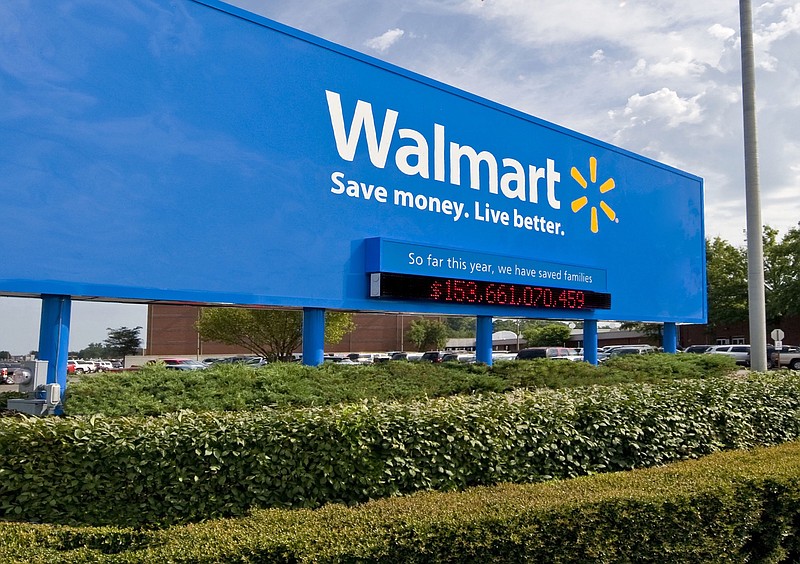Walmart Inc. made progress toward its diversity and environmental goals last year while serving employees, customers and communities during the coronavirus pandemic, the company said in a report released Thursday.
The Bentonville retailer's annual Environmental, Social and Governance report outlines Walmart's efforts in these areas during the previous fiscal year. Thursday's report covers fiscal 2021, which ended on Jan. 31.
Environmental, Social and Governance reports have become a popular source of information for some investors.
Challenges of the last year have "reinforced our desire to accelerate our omnichannel transformation and commit to becoming a regenerative company," said Kathleen McLaughlin, Walmart's chief sustainability officer and president of the Walmart Foundation.
This means "seeking to fulfill our customer mission in a way that restores, renews and replenishes nature and humanity," McLaughlin said.
New in this year's report, McLaughlin said, is a series of "briefs" covering Walmart's environment and social priorities. Unlike the report summary and data tables, the briefs will be refreshed online periodically to provide the most timely information, she said.
Walmart updated its list of priority issues this year based on stakeholder engagement and expectations and relevance to its business, McLaughlin said. These issues are organized under four broad themes: opportunity, sustainability, ethics and integrity, and community.
All of the online briefs are arranged under one of those themes.
Under opportunity, briefs cover equity and inclusion "at Walmart and beyond"; supplier opportunities; and good jobs and advancement for employees. Community briefs include serving communities; providing safer and healthier food and other products; and disaster preparedness and response.
The ethics and integrity theme covers ethics and compliance; engagement in public policy; corporate governance; digital citizenship; and human rights.
The sustainability theme incorporates goals regarding climate change; restoration of natural resources; waste, especially reducing use of plastic packaging and waste going to landfills; people in supply chain; product supply chain sustainability; and animal welfare.
Among Walmart's sustainability achievements last year, the company said it now powers 36% of its operations with renewable resources compared with 29% the year before. Walmart has set goals to use renewable energy sources to power 50% of its operations by 2025 and 100% by 2035.
As for equity and inclusion, though, the report doesn't provide such specific goals or benchmarks. However, Walmart does disclose information about pay, promotion and other key metrics for employees who are female and/or people of color in a separate report now released twice yearly.
Still, the company has begun some initiatives in the past year that it hopes will foster a more inclusive workplace. While officers with Walmart U.S. have had required racial equity training since 2018, a race and inclusion curriculum for all employees started in August on a Walmart learning platform.
The company also is promoting more equitable and inclusive recruiting practices such as leading recruitment programs at historically Black universities
The assessment's criteria "are a set of standards for a company's operations that socially conscious investors use to screen potential investments," according to Investopedia.com, and "are an increasingly popular way for investors to evaluate companies in which they might want to invest."
Essentially, the criteria help investors find companies with values that match their own.
Brian Yarbrough, a retail analyst with financial services firm Edward Jones, said investors are becoming more interested in social and environmental issues and are putting "large inflows" of money into such funds.
"I expect the [environmental, social and governance issues] will probably only grow in importance in investors' minds over the coming years," Yarbrough said.
Still, "growing the business and driving higher profits will most likely be the biggest contributing factor to stock price performance," Yarbrough said.
A 2020 survey by the Morgan Stanley Institute for Sustainable Investing found that almost 95% of millennials were interested in sustainable investing. Also, 75% believe their investment decisions could affect climate-change policy.
Doug McMillon, Walmart's chief executive officer, said in the report that in his current position as chairman of the Business Roundtable, he is encouraged to see many other large companies also working to make a positive difference in social systems and the health of the planet.
"A multi-stakeholder approach is the best way to both build a business in the long term and to reshape systems to be more fair and ultimately regain trust," he said.
